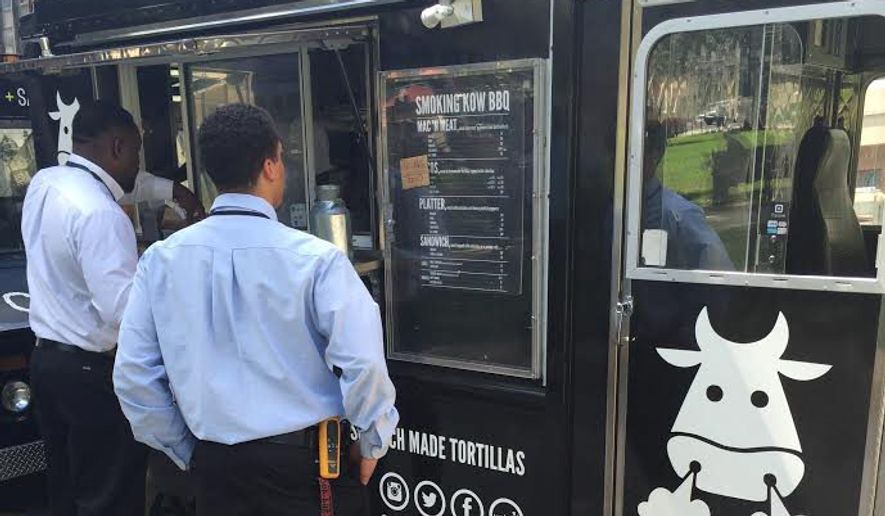For Washingtonians, food trucks have turned a lunchtime famine into a smorgasbord. An outdoor food court at Farragut Square greets customers with the aroma of delicacies that can be purchased and received within a matter of seconds.
Among the hundred-plus trucks that service the nation’s capital, hungry consumers can sample and savor tacos and pizza, Asian and Mediterranean cuisine, crepes, burgers, pies and desserts. Smoking Kow Barbeque is a crowd favorite.
“I started the truck with two things in mind,” says Smoking Kow founder Dylan Kough. “First, I wanted as few items on the menu as possible while still providing a variety. Second, I wanted our cooking and serving process to be as efficient as possible.”
When food trucks burst onto the D.C. scene in 2009, Mr. Kough (pronounced “cow”) was a business and finance major at University of Maryland at College Park who dreamed of operating a food truck where he could sell his favorite — barbecue. Two bachelor’s degrees and a CPA certification later, the time was right for him to take the plunge and pursue his passion.
Sixteen months later, business is booming — not only for Mr. Kough but also dozens of other food truck vendors, whose customers form long lines at lunch time all around downtown Washington.
The D.C. food truck industry had been plagued with issues for years. Chaos would ensue as hundreds of trucks vied with tourists and commuters for prime parking spots in popular parts of the nation’s capital. Several food truck owners can recall the fist fights and traffic accidents that used to occur on a daily basis.
The D.C. Department of Consumer and Regulatory Affairs (DCRA) developed a lottery system in late 2013 to fix this problem. Each month, owners pay $25 to participate in the lottery and then pay $150 to accept their spot. Each truck is given two spots per week that remain the same for a month.
The lottery plan appears to be working. Most food trucks use their social media accounts and smartphone apps to let their fans know where they’ll be for the day.
“For the most part, I like the lottery,” says Mr. Kough. “It assures trucks a parking spot in a certain area which is nice. But sometimes you get stuck with spots that aren’t great.”
Truck owners say that Farragut Square and Ballston are two of the best spots. If they get stuck with a slot in NoMa, it’s likely their business will be below average.
“There are a lot of great food trucks in the District that have great food, but it’s a hard business that takes a lot of hard work.” says Elliot Spaisman, co-owner of Astro Doughnuts and Fried Chicken. “I think some people think it’s easy to get up and go, but lots of hard work goes into the process each day.”
His company opened its doors less than five years ago as a brick-and-mortar restaurant. Its hipster vibe and all-American menu quickly made it a popular eatery. Its brand grew, and the opportunity to launch food truck service was the next step.
“Driving a food truck is like driving around in a billboard,” Mr. Spaisman says. “It has your company’s name and social media accounts plastered all over it.”
Still, the food-truck lottery has some issues to be worked out.
This spring, Smoking Kow purchased its second truck with hopes starting operations late this summer. However, it won’t make its lottery debut until October.
The new truck’s plan was submitted to DCRA on June 7 and approved on July 15; and the truck had its first health inspection on Aug. 3. But to take part in the September lottery, the food truck would have needed to have its health inspection by July 31.
Mr. Kough says he would have suffered a major loss if he weren’t able to sell food outside of the lottery system.
The DCRA did not respond to a request for comment.
When his second truck finally gets a slot, Mr. Kough expects it to be as successful as the first — because Smoking Kow’s customers have their orders filled within seconds of placing them.
The barbecue joint prepares and cooks its food overnight: Once its loaded onto the truck, it only has to be reheated, not cooked — saving time for employees and customers alike.
“To make money, you have to make good food and do it quickly,” Mr. Kough says.
• Julia Porterfield can be reached at jporterfield@washingtontimes.com.




Please read our comment policy before commenting.